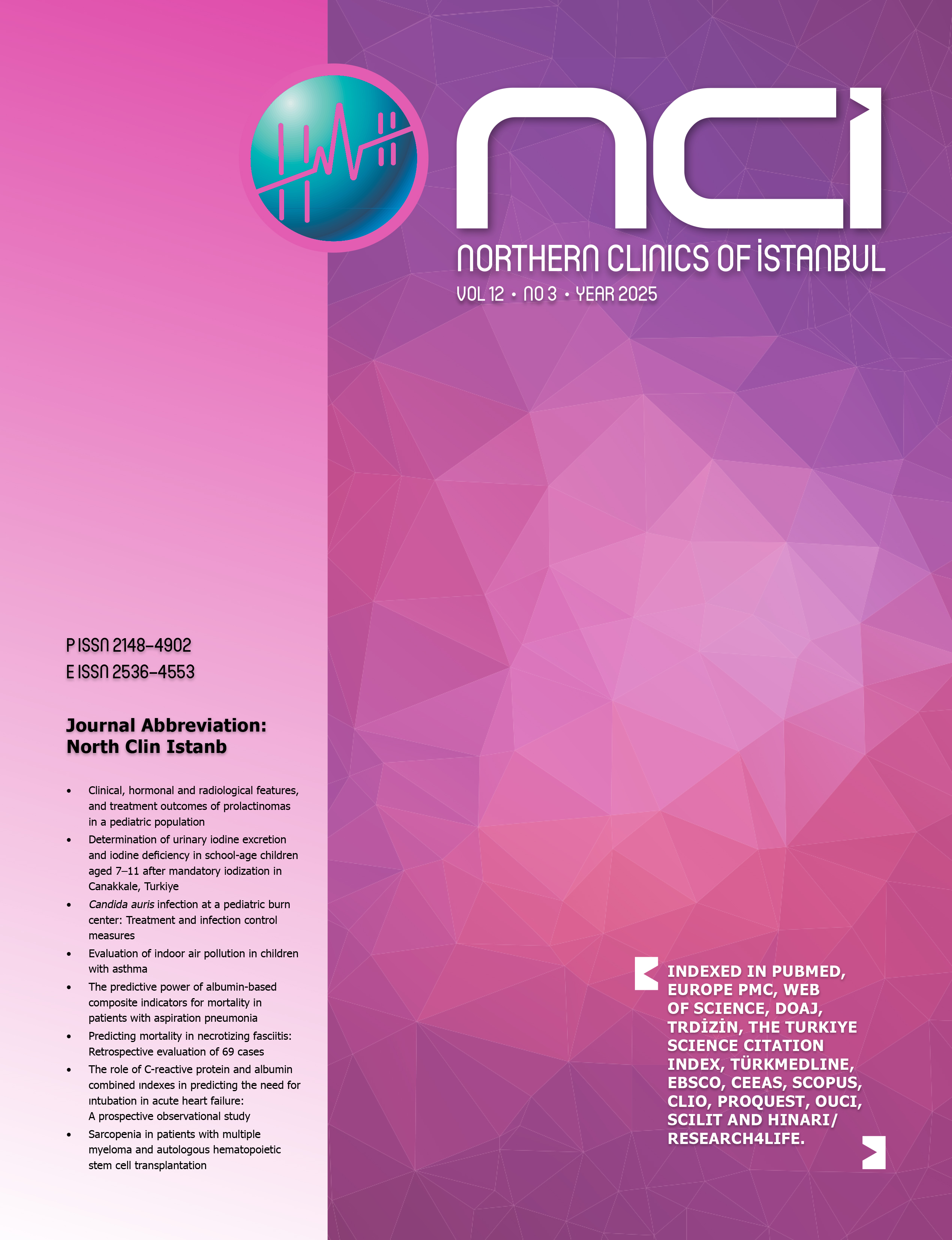Empathy Assessment Scale
Cem MalakciogluDepartment of Medical Education, Istanbul Medeniyet University Faculty of Medicine, Istanbul, TurkiyeOBJECTIVE: Empathy is a prosocial ability and communication skill to feel, understand, and respond to emotions of others; it includes affective and cognitive behavioral aspects of therapeutic communication. For instance, physicians should communicate empathically with their patients. Thus, empathy levels of medical students should be improved during their education. It is important to comparatively evaluate the dimensions of empathy to have a clearer picture of this ability. The aim of this study is to determine the validity and reliability of the Empathy Assessment Scale (EAS) and its subscales.
METHODS: Data were collected between October and December in 2021 from 651 students studying medicine in Istanbul Medeniyet University. Item pool of the scale was developed by the researcher based on the literature review. Two counseling psychologists, two clinical psychologist, and two psychiatrists evaluated the items to detect the face and content validity in the final application form. Both explanatory and confirmatory factor analyses (EFA and CFA) were carried out. The Toronto Empathy Questionnaire was also applied for concurrent validity. IBM SPSS 25 and AMOS 24 were utilized to analyze the construct and concurrent validities, internal consistency, and test-retest reliabilities.
RESULTS: KMO and Bartletts sphericity tests showed that the dataset was suitable for factor analyses (KMO=0.812, Chi-square=5535.718, df=78). A three-factor structure with 13 items was confirmed by EFA, 67.1% of the variance was explained by these three factors. According to CFA, the factor loads of the items varied between 0.39 and 0.98 and data model fit was suitable according to the fit indices (CFI=0.95, TLI=0.91, RMSEA=0.049, SRMR=0.055, and Chi-square/df=1.316). Concurrent validity of the scale was also confirmed by the Pearson correlation (r=0.467, p<0.001). The test-retest reliability values (r) within four weeks interval were all above 0.60 at 0.01 significance level. Cronbachs alpha coefficients were 0.845 (EAS total scale score, 13 items), 0.696 (social interaction subscale score, 4 items), 0.802 (cognitive behavior subscale score, 5 items), and 0.964 (emotional identification subscale score, 4 items).
CONCLUSION: EAS is a valid and reliable measurement tool to assess the empathy levels of individuals in three dimensions: Social interaction, cognitive behavior, and emotional identification. EAS can be used to evaluate the empathy levels for research, educational, and other interventional purposes.
Empati Değerlendirme Ölçeği
Cem Malakciogluİstanbul Medeniyet Üniversitesi Tıp Fakültesi, Tıp Eğitimi Anabilim Dalı, İstanbulAmaç: Empati, başkalarının duygularını hissetmek, anlamak ve bunlara yanıt vermek için gerekli bir sosyal yetenektir ve iletişim becerisidir; terapötik iletişimin duygusal ve bilişsel davranışsal yönlerini içermektedir. Örneğin, hekimler hastalarıyla empatik iletişim kurmalıdır. Bu yüzden, tıp öğrencilerinin empati düzeyleri eğitimleri boyunca geliştirilmelidir. Bu sosyal yeteneğin çok daha net bir resmini elde etmek için empati boyutlarını karşılaştırmalı olarak değerlendirmek önemlidir. Bu çalışmanın amacı Empati Değerlendirme Ölçeğinin (EDÖ) ve alt ölçeklerinin geçerlik ve güvenirliğinin belirlenmesidir.
Yöntem: Veriler 2021 yılının Ekim-Aralık ayları arasında İstanbul Medeniyet Üniversitesi Tıp Fakültesinde okuyan 651 öğrenciden toplanmıştır. Ölçeğin madde havuzu araştırmacı tarafından literatür taramasına dayalı olarak geliştirilmiştir. Son uygulama formundaki maddelerin görünüş ve kapsam geçerliğini tespit etmek için iki uzman psikolojik danışman, iki klinik psikolog ve iki psikiyatrist maddeleri değerlendirilmiştir. Hem açıklayıcı hem de doğrulayıcı faktör analizleri (AFA ve DFA) yapılmıştır. Benzer ölçek geçerliği için katılımcılara Toronto Empati Ölçeği de uygulanmıştır. Yapı ve benzer ölçek geçerliklerini, iç tutarlılık ve test-tekrar test güvenilirliklerini analiz etmek için IBM SPSS 25 ve AMOS 24 programları kullanılmıştır.
Bulgular: KMO ve Bartlett Küresellik testleri veri setinin faktör analizine uygun olduğunu göstermiştir (KMO=0.812, ki-kare=5535.718, df=78). Toplam 13 maddelik üç faktörlü yapı AFA ile doğrulanmıştır, varyansın %67,1'i bu üç faktör tarafından açıklanmıştır. DFA'ya göre madde faktör yükleri 0.39-0.98 arasında değişmekte olup, uyum indekslerine göre veri-model uyumu yeterli düzeydedir (CFI=0.95, TLI=0.91, RMSEA=0.049, SRMR=0.055, Ki-kare/sd=1.316). Benzer ölçekler geçerliği Pearson korelasyon katsayısı ile doğrulanmıştır (r=0.467, p<.001). Dört hafta aralıkla hesaplanan test-tekrar test güvenirlik değerlerinin (r) tamamı 0,01 anlamlılık düzeyinde 0,60'ın üzerinde çıkmıştır. Cronbach alfa katsayıları 0.845 (EDÖ toplam ölçek puanı, 13 madde), 0.696 (Sosyal Etkileşim alt ölçek puanı, 4 madde), 0.802 (Bilişsel Davranış alt ölçek puanı, 5 madde) ve 0.964 (Duygusal Özdeşim alt ölçek puanı, 4 madde) olarak bulunmuştur.
Sonuç: EDÖ kişilerin empati düzeylerini, sosyal etkileşim, bilişsel davranış ve duygusal özdeşim olarak üç alt boyutta değerlendiren geçerli ve güvenilir bir ölçme aracıdır. EDÖ empati düzeylerini değerlendirmek için araştırma, eğitim ve diğer müdahale amaçlarıyla kullanılabilir. (NCI-2022-1-19/R2)
Manuscript Language: English





















